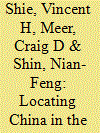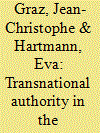| Srl | Item |
| 1 |
ID:
110074


|
|
|
|
|
| Publication |
2012.
|
| Summary/Abstract |
In the early nineteenth century a 'great divergence' occurred that bifurcated civilizations into East and West, sending the former into descent. Since the 1950s, however, the economic growth of East Asia has been nothing short of remarkable. This development has led some scholars, such as Giovanni Arrighi and the colleagues of Takeshi Hamashita, to optimistically suggest the resurgence of East Asia in general and the re-centering of China in particular, a line of reasoning that appears to draw on memories of the China-centered tributary trade system defining the region for centuries. For these scholars, the rise of East Asia after 1950 can be seen as a reversal of the great divergence. We challenge this view. Data show that China has yet to prepare for the new knowledge-based economy. Furthermore, we raise the possibility that Japan may move farther away from, rather than closer to, the traditional center of China in the twenty-first-century East Asian interstate system.
|
|
|
|
|
|
|
|
|
|
|
|
|
|
|
|
| 2 |
ID:
093005


|
|
|
| 3 |
ID:
118135


|
|
|
|
|
| Publication |
2012.
|
| Summary/Abstract |
This article examines the extent and limits of nonstate forms of authority in international relations. It analyzes how the information and communication technology (ICT) infrastructure for the tradability of services in a global knowledge-based economy relies on informal regulatory practices for the adjustment of ICT-related skills. By focusing on the challenge that highly volatile and short-lived cycles of demands for this type of knowledge pose for ensuring the right qualification of the labor force, the article explores how companies and associations provide training and certification programs as part of a growing market for educational services setting their own standards. The existing literature on non-conventional forms of authority in the global political economy has emphasized that the consent of actors, subject to informal rules and some form of state support, remains crucial for the effectiveness of those new forms of power. However, analyses based on a limited sample of actors tend toward a narrow understanding of the issues concerned and fail to fully explore the differentiated space in which nonstate authority is emerging. This article develops a three-dimensional analytical framework that brings together the scope of the issues involved, the range of nonstate actors concerned, and the spatial scope of their authority. The empirical findings highlight the limits of these new forms of nonstate authority and shed light on the role of the state and international governmental organizations in this new context.
|
|
|
|
|
|
|
|
|
|
|
|
|
|
|
|